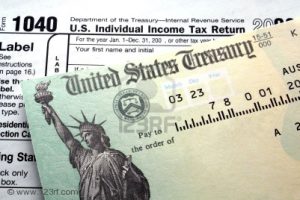
For 2018, individuals and families have a shot of a tax credit ranging from $519 – $6,431. The Earned Income Tax Credit (EITC) was established to offset the burden of Social Security taxes by reducing or eliminating the tax paid by low- and moderate-income wage earners. In other words, a tax credit is issued to these individuals/families that results in a reduction in the amount of money owed the federal government and might mean the taxpayer is eligible for a larger tax refund.
But the benefit of the EITC only occurs if a tax return is filed and the EITC is claimed. That means a return has to be filed even if your income is so low that you normally would not file a tax return. Yes, you are reading this correctly; you can get a check back from the IRS even if you don’t owe taxes.

The guidelines for the EITC are adjusted for inflation every year and vary depending on whether you file as a parent, how many children you claim, and whether you’re single or married. Because the guidelines change from year to year, you may qualify this year even if you did not qualify last year.
Who Qualifies?
In order to qualify to claim the EITC, you must have a Social Security number (SSN) and be a U.S. citizen or resident alien for the entire year you are filing for, or be a nonresident alien married to a U.S. citizen or resident alien and filing a joint return. (A resident alien means you have a “green card,” which gives you the right to live and work in the U.S.) You must have income from a job or self-employment and your income must be below the required levels. Child support does not count as income. Very low income singles and married couples without children can qualify but the income guidelines are more generous for people with dependent children. Foster parents, working grandparents, legally married same-sex couples, farm owners and small business owners also qualify for the Earned Income Tax Credit.
What Counts As Income?
Taxable earned income includes:
- wages, salaries, tips and other taxable;
- union strike benefits and jury duty pay;
- long-term disability benefits received prior to minimum retirement age;
- commissions, royalties and net earnings from self-employment.
Is There More to Know?
For more information about EITC, you can access IRS Publication 596 at https://www.irs.gov/pub/irs-pdf/p596.pdf and the IRS offers even more information at www.eitc.irs.gov. BUT your very own community offers free or very low-cost Volunteer Income Tax Assistance (VITA) programs to help you file your taxes. VITA sites across the country can be located by phoning 800-906-9887 or between mid-January and April at www.irs.gov/Individuals/Find-a-Location-for-Free-Tax-Prep
Who Can Help Locally?
- Information can be obtained
- United Way of Marion County offers FREE income tax preparation through a variety of VITA locations throughout Marion County. Contact United Way of Marion County by calling 2-1-1 (available 24/7) to schedule your appointment. Visit https://www.uwmc.org/volunteer-income-tax-assistance to find a VITA location near you. Remember, you will need to make an appointment.
- AARP Tax-Aide is a tax preparation program for low-to-moderate-income taxpayers, with special attention given to those aged 60 and older. Phone: 888-227-766 or visit https://secure.aarp.org/applications/VMISLocator/searchTaxAideLocations.action from late January/early February to April 15 to locate a site near you.
When Can I Expect My Refund?

If you claim the earned income tax credit (EITC), by law the IRS can’t issue your refund before mid-February. This includes the portion not associated with EITC. To learn more, visit: https://www.irs.gov/individuals/refund-timing
Collect What Is Yours
Only one in five workers who qualify actually take advantage of this break! Don’t fall into the knowledge gap. Take the time to find out if you qualify. After all, you should receive the credit you’ve earned and deserve!
 0
0
